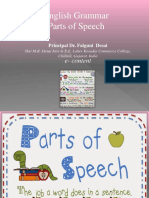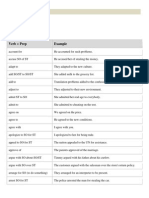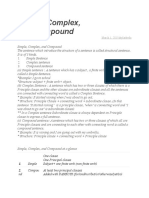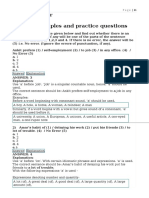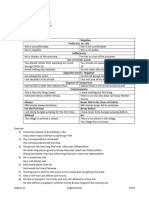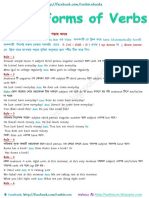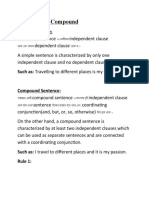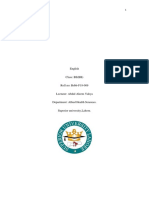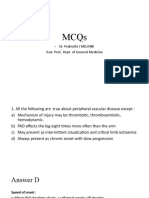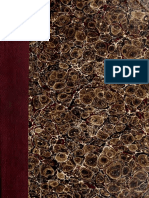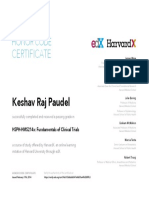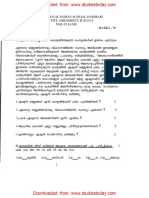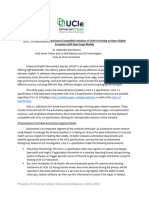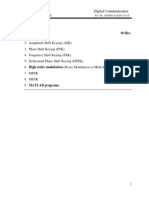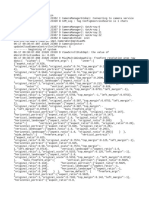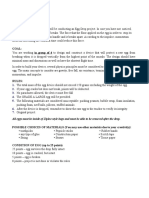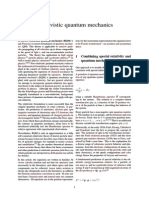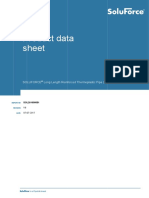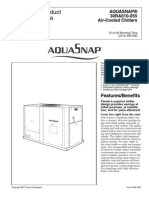Professional Documents
Culture Documents
CBSE Class 5 English Revision Worksheet (17) - Pronouns
CBSE Class 5 English Revision Worksheet (17) - Pronouns
Uploaded by
JROriginal Description:
Original Title
Copyright
Available Formats
Share this document
Did you find this document useful?
Is this content inappropriate?
Report this DocumentCopyright:
Available Formats
CBSE Class 5 English Revision Worksheet (17) - Pronouns
CBSE Class 5 English Revision Worksheet (17) - Pronouns
Uploaded by
JRCopyright:
Available Formats
Downloaded from www.studiestoday.
com
DELHI PUBLIC SCHOOL, AZAAD NAGAR/BARRA KANPUR
Class : V
Sub : English
PRONOUNS
A Pronoun is a word used in place of a noun. For example
Ruchi is a gentle girl. She does not quarrle with anyone. She is ready to
help everyone. All the teachers love her.
Pankaj is a lovely boy. He is always smiling. His neighbors love him
very much.
In the first example given above. the words She and Her stand for
Ruchi. In the next example, the word He, His and Him stand for Pankaj.
The words Ruchi and Pankaj are nouns and the words she, her, he, his
and him are pronouns.
Note:
Pronouns are used to avoid the repetition of nouns.
The noun for which a pronoun stands is called its antecedent. In the
example given above Ruch (noun) is the antecedent of the pronouns
she and her.
Kinds of Pronouns
There are seven kinds of pronouns:
1. Personal Pronoun
2. Demonstrative Pronoun
3. Interrogative Pronoun
4. Reflexive Pronoun
5. Emphasising Pronoun
6. Possessive Pronoun
7. Relative Pronoun
1. Personal Pronoun: stands for persons or things. For example:
(a) I am intelligent
(b) We are brave.
(c) You are healthy
(d) They are young
He/She/Vinay/Veena is simple
In the above sentences, all the italicized words are personal
pronouns because they stand for three persons:
the person speaking (First Person)
the person spoken to (Second Person)
the person spoken of (Third Person)
Downloaded from www.studiestoday.com
Downloaded from www.studiestoday.com
The pronouns I and we denote the person or persons speaking. So they
are said to be personal pronouns of the First Person.
The pronoun you denotes the person or person spoken to. So, they are
said to be personal pronouns of the Second Person.
Note: „You‟ is used both in singular and plural. The pronouns
they/he/she/Vinay/Veena denote the person or persons spoken of.
So, they are said to be personal pronouns of Third Person.
The various forms of personal pronouns are given below:-
Person Singular Plural
First Person I, me, mine we, us, ours (used for both
masculine and feminine)
Second Person you, yours you, yours (used for both
masculine and feminine)
Third Person he, him his (masculine) they, them, theirs (used
she her, hers (feminine) she for masculine, feminine
it (neuter) and neuter genders)
2. Demonstrative Pronouns are used to point out the object/objects to
which they refer. For example:
(a) This is a temple.
(b) These are buildings.
(c) That is a hill.
(d) Those are hills.
Note:- The words this, that, these, those, etc. are adjectives when
used with a noun, but pronouns when used for a noun; as This pen is
mine. (This stands for the noun pen, hence, it is a pronoun, i.e.
demonstrative pronoun)
3. Interrogative Pronoun: It is used for asking questions. For example:
(a) What is your name?
(b) Who came just now?
(c) Which is your bag?
Note:- The words what and which can be used both as an
interrogative pronoun and an interrogative adjective; as
What is your idea? (Interrogative Pronoun)
What idea did you give? (Interrogative Adjective)
Downloaded from www.studiestoday.com
Downloaded from www.studiestoday.com
4. Reflexive Pronoun: Pronouns like myself, yourself, ourselves, when
used as the receiver of an action are called Reflexive Pronouns. For
example:
(a) I hurt myself.
(b) He praised himself.
(c) They helped themselves.
(d) We blamed ourselves.
5. Emphasising Pronoun: It is used to convey emphasis. For
example:
(a) He himself came to me.
(b) You yourself bought these dresses.
(c) They themselves told the truth.
In the above sentences, all the italicized words are Emphasizing
Pronouns.
6. Possessive Pronoun: It shows possession. For example:
(a) These dresses are mine.
(b) That pen is yours.
(c) That building is mine.
(d) These furniture are mine.
In the above sentences, all the italicized words are Emphasising
Pronouns.
7. Relative Pronoun: It relates a noun to a group of words that
follow. For example
(a) This is the pen which I like the most.
(b) The man whom I met yesterday was very gentle.
(c) We praise those children who are obedient.
(d) Here are the story books that you purchased yesterday.
In the above sentences, all the italicized words relate a noun to the
group of words that follow the noun.
Join these sentences using Relative Pronouns:
1. Dr. Radhakrishnan was the second President of India. He was a great
scholar.
2. That lady is my mother. She is arranging my books.
3. Our army destroyed the bunkers. Some terrorist were hiding them.
4. I thanked the doctor. He saved the dog.
5. The incident was very inspiring. You narrated me.
6. The teacher praised the children. They were maintaining the park.
Downloaded from www.studiestoday.com
You might also like
- The Grammar Bible: Everything You Always Wanted to Know About Grammar but Didn't Know Whom to AskFrom EverandThe Grammar Bible: Everything You Always Wanted to Know About Grammar but Didn't Know Whom to AskRating: 4 out of 5 stars4/5 (25)
- Adam's Wine Reading AnswersDocument3 pagesAdam's Wine Reading AnswersSonam Tobgay100% (1)
- Parts of Speech TestDocument4 pagesParts of Speech TestJames BurtonNo ratings yet
- English Grammar Parts of Speech Principal DR Falguni DesaiDocument23 pagesEnglish Grammar Parts of Speech Principal DR Falguni DesaiYoutube NewsNo ratings yet
- Subject and Object Pronouns: EncantadoDocument4 pagesSubject and Object Pronouns: EncantadoMarco A. Quispe PalaciosNo ratings yet
- مادة اثرائية في اللغة الانجليزية للصف الثامن الفصل الثانيDocument44 pagesمادة اثرائية في اللغة الانجليزية للصف الثامن الفصل الثانيLana Darabee100% (1)
- Vocabulary With Bangla MeaningDocument8 pagesVocabulary With Bangla MeaningNaimShantNo ratings yet
- Word TreasureDocument3 pagesWord TreasureFarha TabassumNo ratings yet
- Class 4 CH 6 AdjectivesDocument6 pagesClass 4 CH 6 AdjectivesTarun MankadNo ratings yet
- What Are Adverbial PhrasesDocument3 pagesWhat Are Adverbial PhrasesPaul Dean MarkNo ratings yet
- Relative Clause ExercisesDocument5 pagesRelative Clause Exerciseslylyngoc90No ratings yet
- English TenseDocument39 pagesEnglish TenseTesso RarNo ratings yet
- Rle 401 English SyntaxDocument1 pageRle 401 English SyntaxThēé Kïsïī Grændfæthêé IINo ratings yet
- Verb and Preposition: SO Somebody ST SomethingDocument17 pagesVerb and Preposition: SO Somebody ST SomethingDelia CatrinaNo ratings yet
- Rules of PrepositionsDocument3 pagesRules of PrepositionsSM TANVIR AHAMMADNo ratings yet
- English VerbsDocument21 pagesEnglish VerbsJoseph VijayNo ratings yet
- Parts of SpeechDocument3 pagesParts of SpeechZobiaAzizNo ratings yet
- 11 PrepositionsDocument18 pages11 PrepositionsM usman100% (1)
- Subject-Verb Agreement - Handout 24Document7 pagesSubject-Verb Agreement - Handout 24Veasna ChannNo ratings yet
- English Assignment#2Document7 pagesEnglish Assignment#2M. Ahmad RazaNo ratings yet
- Adjective: Mishra English Study CentreDocument11 pagesAdjective: Mishra English Study CentreABHILESH G K100% (1)
- Direct and Indirect SpeechDocument22 pagesDirect and Indirect SpeechRAJAGURU.V100% (4)
- English Finite and Non Finite VerbsDocument3 pagesEnglish Finite and Non Finite VerbsSona Meiyappan100% (1)
- Spot The Error Common MistakesDocument10 pagesSpot The Error Common MistakesDhiman NathNo ratings yet
- What Will I Learn From Grammar Lesson On Compound Nouns?Document7 pagesWhat Will I Learn From Grammar Lesson On Compound Nouns?Irina MBNo ratings yet
- Grammar Review PacketDocument27 pagesGrammar Review Packetmapplega100% (1)
- 3495 Part 1 Bricks PDFDocument10 pages3495 Part 1 Bricks PDFVb SeriesNo ratings yet
- PRONOUNS 1st Person Singular 2nd Person Singular 3rd Person SingularDocument4 pagesPRONOUNS 1st Person Singular 2nd Person Singular 3rd Person SingularShelley BerryNo ratings yet
- Instituto de Lenguas de La Universidad Distrital - IludDocument2 pagesInstituto de Lenguas de La Universidad Distrital - IludDiego Morales100% (1)
- DeterminerDocument8 pagesDeterminerpreethamNo ratings yet
- Error Rules (Noun, Pronoun, Adjectives)Document12 pagesError Rules (Noun, Pronoun, Adjectives)Qazi BaranNo ratings yet
- Active Passive VoiceDocument14 pagesActive Passive VoiceAbhieey Choi Soo HyunNo ratings yet
- 7 Prepositions - Lecture NotesDocument5 pages7 Prepositions - Lecture NotesAlias AbdullahNo ratings yet
- Verbs Non-Finite FormsDocument10 pagesVerbs Non-Finite FormsElvinNo ratings yet
- Article: Mishra English Study CentreDocument8 pagesArticle: Mishra English Study CentrePrincy Gupta100% (1)
- Verb / Action: Mishra English Study CentreDocument30 pagesVerb / Action: Mishra English Study CentreAmit kumar100% (1)
- Direct and Indirect 3Document6 pagesDirect and Indirect 3ocampoapriljoyceNo ratings yet
- Basic Sentence Patterns in EnglishDocument16 pagesBasic Sentence Patterns in Englishsalwa296No ratings yet
- 6 Simple, Complex, and CompoundDocument15 pages6 Simple, Complex, and CompoundHarunur RashidNo ratings yet
- Relative Clause: Toeic PreparationDocument24 pagesRelative Clause: Toeic PreparationAlifaisyah BaydillaNo ratings yet
- Naration Change Rules PDFDocument6 pagesNaration Change Rules PDFAnarul IslamNo ratings yet
- What Is An AdverbDocument12 pagesWhat Is An AdverbJuan GarciaNo ratings yet
- Spot The Error ArticlesDocument7 pagesSpot The Error ArticlesDhiman NathNo ratings yet
- TSPH 3Document4 pagesTSPH 3singhar.1023No ratings yet
- Unit 1 Making Connections BE1 Part 1Document32 pagesUnit 1 Making Connections BE1 Part 1Durga Sri100% (1)
- Daily English GainDocument21 pagesDaily English GainMd ShahabuddinNo ratings yet
- Sentence Types. (COMPOUND, COMPLEX, AND COMPOUND COMPLEX)Document15 pagesSentence Types. (COMPOUND, COMPLEX, AND COMPOUND COMPLEX)Soekotjo A.No ratings yet
- Noun and Its Types With Examples PDFDocument4 pagesNoun and Its Types With Examples PDFConstantin AlexandruNo ratings yet
- Collocations For StudentsDocument3 pagesCollocations For StudentsOldemary Deschamps100% (1)
- AdverbDocument7 pagesAdverbMuhammad Talha AmjadNo ratings yet
- Right Forms of Verbs PDFDocument20 pagesRight Forms of Verbs PDFAshief Ahmed44% (9)
- So..that... - Such... That...Document5 pagesSo..that... - Such... That...Ristia Nurul KamilaNo ratings yet
- Part of Speech English GrammerDocument16 pagesPart of Speech English GrammerSumang GjmNo ratings yet
- Direct and Indirect Speech RulesDocument4 pagesDirect and Indirect Speech RulesMayur MeenaNo ratings yet
- Parts of Speech Noun Pronouns ArticlesDocument14 pagesParts of Speech Noun Pronouns ArticlesSaqib KiyaniNo ratings yet
- Simple Complex and CompoundDocument38 pagesSimple Complex and CompoundTouhid AnikNo ratings yet
- Special Use of Phrases and Words RulesDocument4 pagesSpecial Use of Phrases and Words RulesManjare Hassin RaadNo ratings yet
- Assignment Report NounDocument9 pagesAssignment Report NounAqil HongkiNo ratings yet
- EnglishDocument18 pagesEnglishToram LoversNo ratings yet
- pronoun ADocument5 pagespronoun AsamanNo ratings yet
- Dr. Prakruthi J MD, DNB Asst. Prof., Dept. of General MedicineDocument142 pagesDr. Prakruthi J MD, DNB Asst. Prof., Dept. of General MedicineJRNo ratings yet
- The Homoeopathic Recorder 1905Document594 pagesThe Homoeopathic Recorder 1905JRNo ratings yet
- Echanical Sphyxia: HapterDocument16 pagesEchanical Sphyxia: HapterJRNo ratings yet
- Revised BSNL Bharat Fiber FTTH Broadband Plans October 2020Document18 pagesRevised BSNL Bharat Fiber FTTH Broadband Plans October 2020JRNo ratings yet
- Fundamentals of Clinical TrialsDocument1 pageFundamentals of Clinical TrialsJR0% (1)
- Authorisation To Trademark Attorney in The Matters of Trademark Registration and Representation in Relation TheretoDocument2 pagesAuthorisation To Trademark Attorney in The Matters of Trademark Registration and Representation in Relation TheretoJRNo ratings yet
- CBSE Class 5 English Revision Worksheet (18) - AdjectivesDocument1 pageCBSE Class 5 English Revision Worksheet (18) - AdjectivesJR100% (11)
- Form - A (See Regulation 4) : Attested Photograph Pl. See S.No.3 Under Below N.B. Page 2Document4 pagesForm - A (See Regulation 4) : Attested Photograph Pl. See S.No.3 Under Below N.B. Page 2JRNo ratings yet
- CBSE Class 5 English Revision Worksheet (16) - AdjectivesDocument4 pagesCBSE Class 5 English Revision Worksheet (16) - AdjectivesJR100% (1)
- CBSE Class 5 English Revision Worksheet (6) - AdjectivesDocument2 pagesCBSE Class 5 English Revision Worksheet (6) - AdjectivesJR100% (7)
- CBSE Class 6 Malayalam Question Paper SA2 2014 PDFDocument4 pagesCBSE Class 6 Malayalam Question Paper SA2 2014 PDFJRNo ratings yet
- Kents Twelve ObservationDocument21 pagesKents Twelve ObservationJR100% (1)
- 1591721766congreve 1Document11 pages1591721766congreve 1Priyanka Mondal100% (1)
- Thermal EnggDocument7 pagesThermal EnggVikram RaoNo ratings yet
- 1.5art and ExperienceDocument15 pages1.5art and ExperienceDZ LarizaNo ratings yet
- UCIe 1.1 - White - Paper - 2023 - FINALDocument6 pagesUCIe 1.1 - White - Paper - 2023 - FINALbharathNo ratings yet
- Ask-Psk-FskDocument15 pagesAsk-Psk-Fskhamza mohsenNo ratings yet
- Review of Object OrientationDocument50 pagesReview of Object OrientationJobair Al NahianNo ratings yet
- Green Preparation of Bioplastics Based On Degradation and Chemical Modification of Lignin ResidueDocument20 pagesGreen Preparation of Bioplastics Based On Degradation and Chemical Modification of Lignin ResidueAndres VargasNo ratings yet
- Log Cat 1686969007032Document764 pagesLog Cat 1686969007032Mbahjo BstrfNo ratings yet
- Pounds Per Square Inch: Navigation SearchDocument7 pagesPounds Per Square Inch: Navigation SearchdsmnnangNo ratings yet
- Egg DropDocument2 pagesEgg DropLeah ClovisNo ratings yet
- Product Spec.: 002-4-422-WG-SPC Family: Wall-Smart Model: DWG No. Model No.: Ws NC For Ipad Mini 6 With GrillsDocument2 pagesProduct Spec.: 002-4-422-WG-SPC Family: Wall-Smart Model: DWG No. Model No.: Ws NC For Ipad Mini 6 With GrillsMichaelNo ratings yet
- Intellectual JihadDocument12 pagesIntellectual JihadayangarmyNo ratings yet
- 3rd Periodecal Test EppDocument7 pages3rd Periodecal Test EppFlorence ReveseNo ratings yet
- Chef Damu News (EDocFind - Info)Document2 pagesChef Damu News (EDocFind - Info)PraveenKumarNo ratings yet
- Super-Sized Science Projects With Volume - How Much Space Does It Take Up!Document50 pagesSuper-Sized Science Projects With Volume - How Much Space Does It Take Up!Sal OtNo ratings yet
- SDocument14 pagesSKeyur GajjarNo ratings yet
- GS6 Manual Operacion y Partes PDFDocument458 pagesGS6 Manual Operacion y Partes PDFpablo.matulic9471No ratings yet
- 2019 RecallsDocument39 pages2019 RecallskyahuaNo ratings yet
- Stairville Consola Junio 2015 PDFDocument28 pagesStairville Consola Junio 2015 PDFSilvia PrietoNo ratings yet
- General DataDocument36 pagesGeneral DataRoong JumroonratNo ratings yet
- Can You Explain Model, View, and Controller in MVC?Document39 pagesCan You Explain Model, View, and Controller in MVC?paparos486No ratings yet
- RQM PDFDocument14 pagesRQM PDFSayan SenguptaNo ratings yet
- International Financial Security Olympiad NewDocument1 pageInternational Financial Security Olympiad Neweliyas mohammedNo ratings yet
- Your Home November 2020Document166 pagesYour Home November 2020Simoun IbarraNo ratings yet
- Soluforce - Product Data Sheet - 7.7.17 Rev 8Document22 pagesSoluforce - Product Data Sheet - 7.7.17 Rev 8hendry_hdwNo ratings yet
- 2011 7 Abs PDFDocument8 pages2011 7 Abs PDFRamakrishna ReddyNo ratings yet
- LoftingDocument206 pagesLoftingeventnowNo ratings yet
- 30ran Scroll 10 - 55 TonDocument48 pages30ran Scroll 10 - 55 TonAliberth MolinaNo ratings yet
- 名词 数词 形容词 副词 专项练习 I. Multiple ChoiceDocument5 pages名词 数词 形容词 副词 专项练习 I. Multiple ChoiceFelix HouNo ratings yet
- Alkynes: An Introduction To Organic Synthesis: (Ref: Mcmurry'S Organic Chemistry, 7 Edition)Document24 pagesAlkynes: An Introduction To Organic Synthesis: (Ref: Mcmurry'S Organic Chemistry, 7 Edition)Tristan BadillaNo ratings yet



